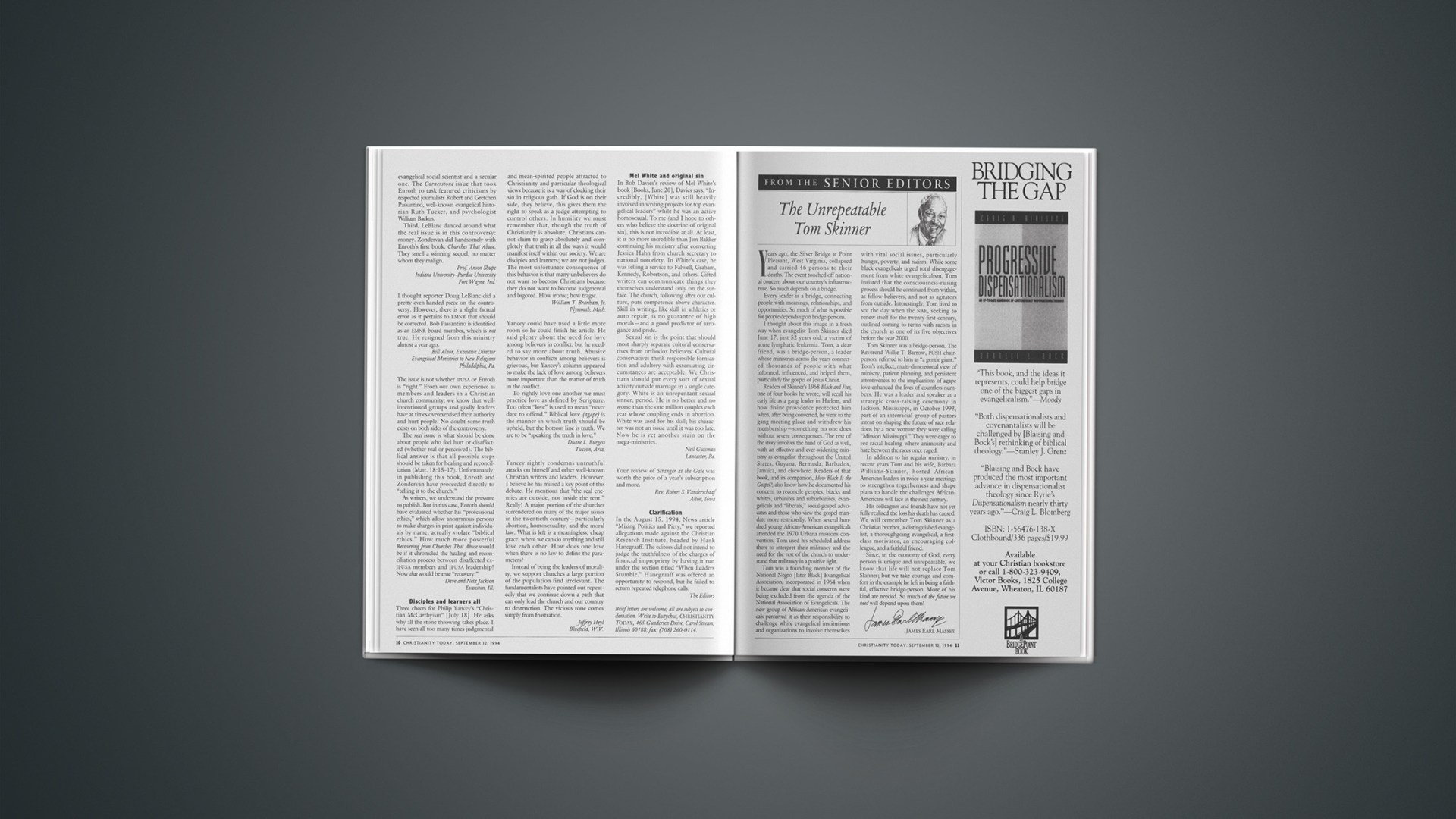Years ago, the Silver Bridge at Point Pleasant, West Virginia, collapsed and carried 46 persons to their deaths. The event touched off national concern about our country’s infrastructure. So much depends on a bridge.
Every leader is a bridge, connecting people with meanings, relationships, and opportunities. So much of what is possible for people depends upon bridge-persons.
I thought about this image in a fresh way when evangelist Tom Skinner died June 17, just 52 years old, a victim of acute lymphatic leukemia. Tom, a dear friend, was a bridge-person, a leader whose ministries across the years connected thousands of people with what informed, influenced, and helped them, particularly the gospel of Jesus Christ.
Readers of Skinner’s 1968 “Black and Free,” one of four books he wrote, will recall his early life as a gang leader in Harlem, and how divine providence protected him when, after being converted, he went to the gang meeting place and withdrew his membership-something no one does without severe consequences. The rest of the story involves the hand of God as well, with an effective and ever-widening ministry as evangelist throughout the United States, Guyana, Bermuda, Barbados, Jamaica, and elsewhere. Readers of that book, and its companion, “How Black Is the Gospel?”, also know how he documented his concern to reconcile peoples, blacks and whites, urbanites and suburbanites, evangelicals and “liberals,” social-gospel advocates and those who view the gospel mandate more restrictedly. When several hundred young African-American evangelicals attended the 1970 Urbana missions convention, Tom used his scheduled address there to interpret their militancy and the need for the rest of the church to understand that militancy in a positive light.
Tom was a founding member of the National Negro [later Black] Evangelical Association, incorporated in 1964 when it became clear that social concerns were being excluded from the agenda of the National Association of Evangelicals. The new group of African-American evangelicals perceived it as their responsibility to challenge white evangelical institutions and organizations to involve themselves with vital social issues, particularly hunger, poverty, and racism. While some black evangelicals urged total disengagement from white evangelicalism, Tom insisted that the consciousness-raising process should be continued from within, as fellow-believers, and not as agitators from outside. Interestingly, Tom lived to see the day when the NAE, seeking to renew itself for the twenty-first century, outlined coming to terms with racism in the church as one of its five objectives before the year 2000.
Tom Skinner was a bridge-person. The Reverend Willie T. Barrow, PUSH chairperson, referred to him as “a gentle giant.” Tom’s intellect, multi-dimensional view of ministry, patient planning, and persistent attentiveness to the implications of agape love enhanced the lives of countless numbers. He was a leader and speaker at a strategic cross-raising ceremony in Jackson, Mississippi, in October 1993, part of an interracial group of pastors intent on shaping the future of race relations by a new venture they were calling “Mission Mississippi.” They were eager to see racial healing where animosity and hate between the races once raged.
In addition to his regular ministry, in recent years Tom and his wife, Barbara Williams-Skinner, hosted AfricanAmerican leaders in twice-a-year meetings to strengthen togetherness and shape plans to handle the challenges African-Americans will face in the next century. His colleagues and friends have not yet fully realized the loss his death has caused. We will remember Tom Skinner as a Christian brother, a distinguished evangelist, a thoroughgoing evangelical, a first-class motivator, an encouraging colleague, and a faithful friend.
Since, in the economy of God, every person is unique and unrepeatable, we know that life will not replace Tom Skinner; but we take courage and comfort in the example he left in being a faithful, effective bridge-person. More of his kind are needed. So much of the future we need will depend upon them!
Copyright © 1994 Christianity Today. Click for reprint information.










